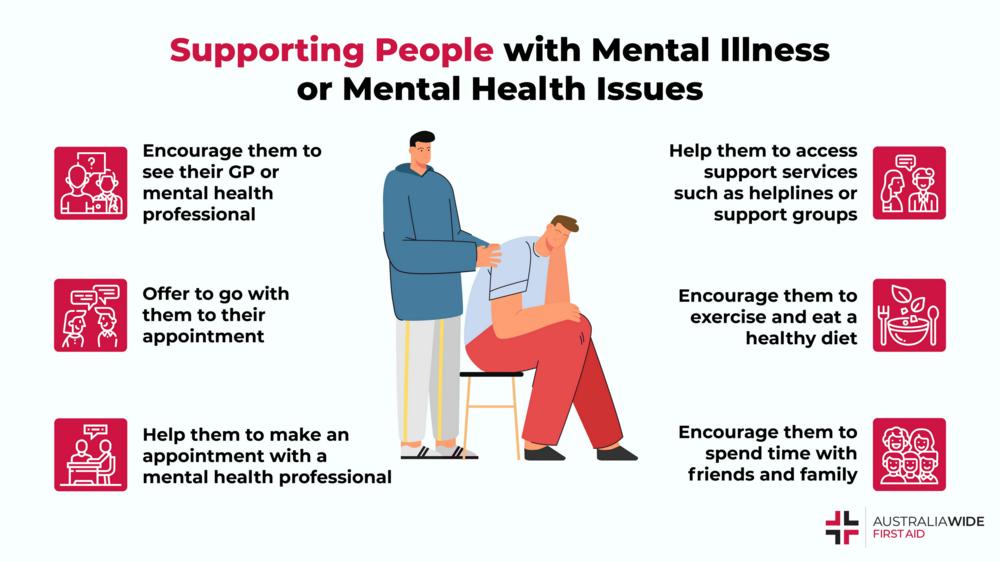Strengthening Community Support For Mental Health: 5 Practical Approaches

Table of Contents
Raising Awareness and Reducing Stigma
Addressing the stigma surrounding mental health is crucial for strengthening community support. Open conversations and education are key to dismantling harmful stereotypes and encouraging help-seeking behavior.
Educational Campaigns and Public Awareness Initiatives
Effective public health campaigns are vital for increasing mental health literacy. This involves educating the public about various mental health conditions, their symptoms, and available treatments.
- Launch community-based educational programs: Offer workshops, seminars, and online courses on understanding mental health conditions like anxiety, depression, and PTSD.
- Partner with schools, workplaces, and community centers: Integrate mental health education into existing programs and utilize these established networks to reach a wider audience.
- Utilize social media and local media outlets: Employ engaging content to reach diverse demographics and combat misinformation. Collaborate with local journalists and influencers to create impactful narratives.
- Organize events: Host film screenings, guest speaker events, and interactive workshops to create engaging learning experiences and stimulate discussion.
These initiatives contribute significantly to mental health awareness and stigma reduction, fostering a more supportive community environment.
Promoting Positive Mental Health Narratives
Countering negative stereotypes requires showcasing positive narratives of recovery and resilience. Sharing personal stories humanizes mental health challenges and inspires hope.
- Share personal stories: Encourage individuals to share their experiences in safe and supportive settings, promoting empathy and understanding.
- Feature community champions: Highlight the work of individuals and organizations dedicated to improving mental health support within the community.
- Celebrate successes: Showcase the positive impacts of community mental health initiatives to inspire further action and engagement.
By sharing positive mental health stories, we can foster a culture of hope and create a more inclusive community for those affected by mental illness.
Improving Access to Mental Healthcare Services
Accessibility and affordability are major obstacles to receiving timely mental healthcare. Addressing these barriers is essential for strengthening community support.
Expanding Access to Affordable and Accessible Care
Financial limitations and geographical barriers often prevent individuals from accessing needed mental health services. Expanding access requires a multi-pronged approach.
- Advocate for increased funding: Lobby for government investment in community mental health services, including expanding access to affordable insurance coverage.
- Support mobile crisis intervention teams: These teams provide immediate support to individuals in crisis, particularly in underserved areas.
- Increase telehealth services: Telehealth offers convenient access to mental health professionals, especially for those in remote locations or with mobility challenges.
Strengthening Referral Pathways and Collaboration
Efficient and seamless referral pathways are crucial for ensuring individuals receive appropriate and timely care. This necessitates strong collaboration amongst healthcare providers.
- Improve inter-professional communication: Foster better collaboration between primary care physicians, psychiatrists, social workers, and community organizations.
- Develop clear referral pathways: Streamline the process of accessing mental health services by establishing a clear and efficient referral system.
- Establish a central point of contact: Create a centralized resource to connect individuals with information and support services.
These measures will ensure a more integrated and effective system for delivering mental healthcare.
Empowering Community-Based Support Networks
Community-based support networks play a vital role in providing ongoing support and fostering a sense of belonging.
Developing Peer Support Groups and Self-Help Initiatives
Peer support groups offer invaluable emotional support and shared experiences, reducing feelings of isolation.
- Support the creation of peer-led support groups: Provide training and resources to individuals who can facilitate these groups effectively.
- Promote online support communities: Utilize online platforms to connect individuals who might not be able to attend in-person meetings.
- Offer training for peer support leaders: Equip leaders with the skills and resources necessary to provide high-quality support to group members.
These initiatives can significantly improve the mental wellbeing of individuals within the community.
Strengthening Family and Social Support Systems
Families and social networks often play a critical role in supporting individuals with mental health challenges. Empowering these systems is essential.
- Educate families and caregivers: Provide training and resources to help families understand mental health conditions and provide effective support.
- Offer family therapy: Support families through challenges by providing professional guidance and therapy sessions.
- Promote healthy coping mechanisms: Encourage stress management techniques and healthy communication within families.
Supporting families empowers them to become active participants in their loved ones' recovery journeys.
Building Inclusive and Supportive Communities
Creating inclusive and accessible communities requires a proactive approach across various sectors, fostering a sense of belonging and reducing social isolation.
Promoting Mental Health in the Workplace
The workplace can be a significant source of stress or support. Promoting mental health in this environment is vital.
- Encourage mental health policies: Promote policies that offer mental health days, employee assistance programs, and flexible work arrangements.
- Train managers and supervisors: Equip them with the skills to recognize signs of mental health distress and provide support to employees.
- Foster open communication: Create a culture of open communication, reducing stigma and encouraging help-seeking behavior.
Creating Inclusive and Accessible Community Spaces
Community spaces should be designed with accessibility and inclusivity in mind, welcoming individuals regardless of their mental health status.
- Design accessible spaces: Ensure community facilities are physically accessible and cater to the needs of individuals with disabilities.
- Promote social inclusion: Organize community events and activities that are inclusive and welcoming to everyone.
- Reduce social isolation: Develop programs that connect individuals with others and combat feelings of loneliness.
Advocating for Policy Changes and Resource Allocation
Effective advocacy is crucial for securing necessary resources and implementing effective policies.
Advocating for Increased Funding and Policy Reform
Securing adequate funding and implementing evidence-based policies are critical for long-term success.
- Advocate for increased government funding: Lobby for increased government investment in community mental health services and research.
- Support evidence-based policies: Advocate for policies grounded in research and best practices.
- Address systemic barriers: Work to remove obstacles to accessing mental healthcare, such as insurance limitations and geographical barriers.
Promoting Data-Driven Decision Making
Using data to inform policy decisions ensures that resources are allocated effectively and programs are evaluated rigorously.
- Identify service gaps: Analyze data to identify unmet needs and areas requiring improvement.
- Monitor program effectiveness: Track the impact of mental health initiatives to ensure they are achieving their intended outcomes.
- Promote transparency and accountability: Ensure that mental health services are provided ethically and effectively.
Conclusion
Strengthening community support for mental health requires a multifaceted approach encompassing awareness campaigns, improved access to services, empowering community networks, inclusive environments, and effective advocacy. By implementing these five practical approaches, we can create more resilient communities where individuals struggling with mental health challenges receive the support they need and deserve. Let's work together to build a future where mental wellbeing is prioritized and everyone has access to the support they need. Join the movement to strengthen community support for mental health – your involvement makes a difference.

Featured Posts
-
 Fortnites Future Assessing The Impact Of Game Mode Closures
May 02, 2025
Fortnites Future Assessing The Impact Of Game Mode Closures
May 02, 2025 -
 The Target Dei Controversy A Case Study In Brand Reputation And Consumer Response
May 02, 2025
The Target Dei Controversy A Case Study In Brand Reputation And Consumer Response
May 02, 2025 -
 Analyzing Ps 5 And Xbox Series X S Sales Performance In The United States
May 02, 2025
Analyzing Ps 5 And Xbox Series X S Sales Performance In The United States
May 02, 2025 -
 Kme Vedjegy A Kivalo Minoseg Jelkepe A Mecsek Baromfi Kft Termekein
May 02, 2025
Kme Vedjegy A Kivalo Minoseg Jelkepe A Mecsek Baromfi Kft Termekein
May 02, 2025 -
 V Sogde Obsudili Mery Borby S Torgovley Lyudmi Itogi Vstrechi
May 02, 2025
V Sogde Obsudili Mery Borby S Torgovley Lyudmi Itogi Vstrechi
May 02, 2025
Latest Posts
-
 Lee Anderson Celebrates Councillors Move To Reform
May 03, 2025
Lee Anderson Celebrates Councillors Move To Reform
May 03, 2025 -
 Councillors Defection To Reform A Major Blow For Labour
May 03, 2025
Councillors Defection To Reform A Major Blow For Labour
May 03, 2025 -
 Reform Party Gains Momentum Councillor Switches From Labour
May 03, 2025
Reform Party Gains Momentum Councillor Switches From Labour
May 03, 2025 -
 Labour Councillor Defects To Reform A Seismic Shift In Politics
May 03, 2025
Labour Councillor Defects To Reform A Seismic Shift In Politics
May 03, 2025 -
 Lee Anderson Welcomes Councillor Defection To Reform Party
May 03, 2025
Lee Anderson Welcomes Councillor Defection To Reform Party
May 03, 2025
